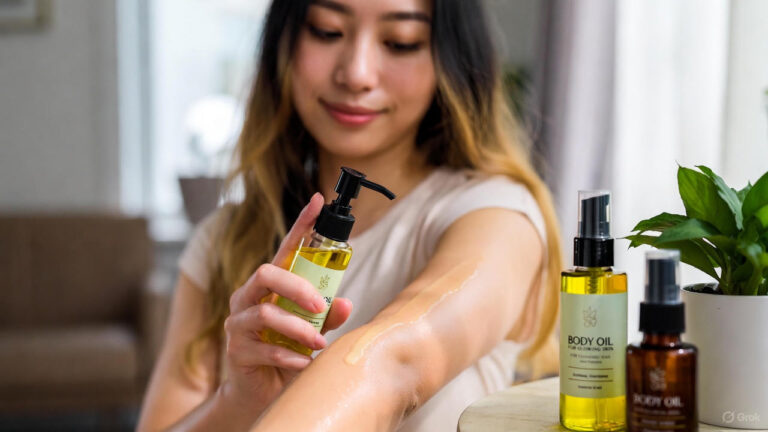Choosing the best body lotion is essential for maintaining soft, smooth, and hydrated skin. With countless options available on the market, finding the perfect match for your skin type can feel like a daunting task.
In this comprehensive guide, we’ll explore the key factors to consider when choosing the right body lotion for your skin type. From understanding your skin’s unique characteristics to selecting the appropriate ingredients, you’ll learn how to navigate the comprehensive array of options and find a body lotion that leaves your skin looking and feeling its best.
Factors to Consider When Choosing a Body Lotion
1. Understand Your Skin Type
Before selecting a body lotion, it’s essential to understand your skin type and its unique characteristics. Skin types typically fall into four categories: dry, oily, combination, and sensitive. Dry skin tends to feel tight, rough, and may be prone to flakiness, especially in colder months.
Oily skin is characterized by excess sebum production, leading to a shiny complexion and potential breakouts. Combination skin features both dry and oily areas, while sensitive skin is easily irritated and may react negatively to certain ingredients.
2. Choose the Right Ingredients
When selecting a body lotion, pay close attention to the ingredients list to ensure it meets your skin’s specific needs. For dry skin, look for moisturizing ingredients such as hyaluronic acid, glycerin, shea butter, or ceramides, which help to hydrate and nourish the skin. Avoid lotions containing alcohol or fragrances, as these can further dry out the skin and cause irritation.
For oily or acne-prone skin, opt for lightweight, non-comedogenic formulas that won’t clog pores or exacerbate breakouts. Look for ingredients like salicylic acid, niacinamide, or tea tree oil, which help to regulate oil production and prevent blemishes.
If you have sensitive skin, choose fragrance-free and hypoallergenic body lotions formulated with gentle ingredients such as colloidal oatmeal, aloe vera, or chamomile extract. Avoid harsh additives like sulfates, parabens, and dyes, which can trigger irritation and inflammation.
3. Consider Additional Benefits
In addition to moisturizing properties, many body lotions offer additional benefits to address specific skin concerns. For example, some formulations may contain antioxidants like vitamin C or E, which help to protect the skin from environmental damage and promote a more youthful appearance. Others may feature ingredients like retinol or peptides, which help to improve skin texture and firmness over time.
If you struggle with uneven skin tone or hyperpigmentation, look for body lotions containing ingredients like niacinamide, kojic acid, or alpha hydroxy acids (AHAs), which help to brighten and even out the complexion. Similarly, if you’re concerned about signs of aging, choose anti-aging body lotions that target fine lines, wrinkles, and sagging skin.
4. Test for Sensitivity
Before applying a new body lotion all over your body, it’s a good idea to perform a patch test to check for sensitivity or allergic reactions. Apply a small amount of the lotion to a discreet area of skin, such as the inner forearm, and wait 24-48 hours to see if any redness, itching, or irritation occurs. If you experience any adverse reactions, discontinue use immediately and consult a dermatologist.
5. Consider Texture and Absorption
When choosing a body lotion, consider the texture and absorption rate that best suits your preferences and lifestyle. Some people prefer lightweight, fast-absorbing lotions that leave a matte finish, while others may prefer richer, more emollient formulas that provide intense hydration and leave a subtle sheen on the skin. Experiment with different textures to find the perfect balance between hydration and comfort for your skin type.
Conclusion
Choosing the right body lotion is essential for maintaining healthy, hydrated skin that looks and feels its best. By understanding your skin type, selecting the appropriate ingredients, and considering additional benefits, you can find a body lotion that addresses your specific concerns and enhances your overall skincare routine. Whether you have dry, oily, sensitive, or combination skin, there is a perfect body lotion out there to meet your needs. With these tips in mind, you can confidently navigate the world of body care and achieve the soft, smooth skin you deserve.
Frequently Asked Questions (FAQs)
1. How do I know my skin type?
Determining your skin type involves assessing various factors such as oiliness, dryness, sensitivity, and susceptibility to breakouts. Dry skin may feel tight, rough, or flaky, while oily skin tends to be shiny and prone to blemishes. Combination skin features both dry and oily areas, while sensitive skin may react negatively to certain products or environmental triggers. If you’re unsure of your skin type, consider consulting a dermatologist for a professional assessment.
2. Can body lotion be used on the face?
While body lotion is formulated for use on the body, some people may choose to use it on their face in a pinch. However, facial skin tends to be more delicate and prone to sensitivity than body skin, so it’s generally best to use products specifically formulated for the face. Facial moisturizers are designed to be lighter in texture and non-comedogenic, meaning they won’t clog pores or cause breakouts.
3. How often should I apply body lotion?
The frequency of body lotion application depends on your skin’s individual needs and preferences. Some people may choose to apply lotion once or twice daily, while others may prefer to moisturize after showering or bathing to lock in hydration. Pay attention to how your skin feels throughout the day and adjust your moisturizing routine accordingly. If you have dry skin, you may need to apply lotion more frequently to keep your skin hydrated and comfortable.
4. Are there any ingredients I should avoid in body lotion?
When selecting a body lotion, it’s best to avoid ingredients that may irritate or sensitise the skin. Common culprits include alcohol, fragrances, sulfates, parabens, and dyes. These additives can strip the skin of its natural oils, cause irritation, or trigger allergic reactions, particularly in those with sensitive skin. Opt for fragrance-free and hypoallergenic formulas whenever possible, and check the ingredients list for potential irritants before purchasing a body lotion.
5. Can I mix different body lotions together?
While there’s technically nothing stopping you from mixing different body lotions together, it’s generally not necessary and may not yield the desired results. Most body lotions are formulated to deliver specific benefits based on their ingredients and concentrations. Mixing different formulations together could dilute their effectiveness or cause unexpected interactions. Instead of mixing lotions, consider layering them by applying one lotion at a time and allowing each to fully absorb before applying the next.



